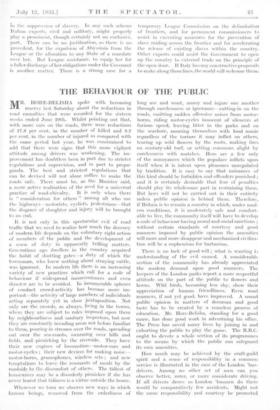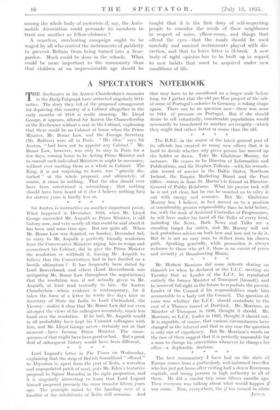THE BEHAVIOUR OF THE PUBLIC
M.R. HORE-BELISHA spoke with becoming reserve last Saturday about the reductions in road casualties that were recorded for the sixteen Weeks ended June 29th. Whilst pointing out that, with more cars on the roads; there were reductions of 17.8 per cent. in the number of killed and 9.2 per cent. in the number of injured as compared with the same period last year, he, was constrained to add that there were signs that this more vigilant attitude among drivers was weakening. The im- provement has doubtless been in part due to stricter regulations and supervision, and in part to propa- ganda. The best and strictest regulations that can be . devised will not alone suffice to make the roads safe. There must be, as the Minister said, a more active realization of the need for a universal practice of road-chivalry. It is only when there is " consideration for Others ". among all who use the highways—motorists, cyclists, pedestrians—that the disgrace of slaughter and injury will be brought to an end.
It is not only in this spectacular evil of road traffic that we need to realize how much the decency of modern life depends on the voluntary right action of members of the public and the development of a sense of duty in apparently trifling matters. Generations ago dwellers in the country acquired the habit of shutting gates—a duty of which the townsman, who knew nothing about straying cattle, was ignorant. In modern life there is an increasing variety of new practices which call for a code of behaviour if widespread inconveniences and even disaster are to be avoided. In innumerable spheres of conduct crowd-activity has become more im- portant-7-the activity of large numbers of individuals acting separately yet in close juxtaposition. Not only are, the crowds, as always, living in the towns, where, they are subject to rules imposed upon them by neighbourliness and sanitary inspectors, but now they are constantly invading areas not before familiar to them, pouring in streams over the roads, spreading out over the sea-coasts, swarming over hills and fields, and 'picnicking by the riverside. They have their new engines of locomotion—motor-cars and motor-cycles ; their new devices for making, noise- motor-horns,, gramophones, wireless sets ; and new temptations to leav,e; the remnants of meals by the roadside to the discomfort of others.. The tidiest of housewives may be a disorderly picnicker if she has never learnt that tidiness is a virtue outside the house.
Wherever we turn we observe new ways in which. human beings, removed from the orderliness of long use and wont, annoy and injure one another through carelessness or ignorance—cutting-in on the roads, emitting sudden offensive noises from motor- horns, riding motor-cycles innocent of silencers at furious speed, leaving litter in the parks and on the seashore, amusing themselves with loud music regardless of the torture it may inflict on others, tearing up wild flowers by the roots, making fires on century-old turf, or setting commons alight by carelessness with matches. Here are a few only of the annoyances which the populace inflicts upon itself when it is intent upon pleasures unregulated by tradition. It is easy to say that nuisances of this kind should be forbidden and offenders punished ; and it is certainly desirable that fear of penalties should play its wholesome part in restraining them. But laws will not be carried out in their entirety unless public opinion is behind them. Therefore, if Britain is to remain a country in which, under mod- ern conditions, it is moderately safe and comfort- able to live, the community itself will have to develop a code of behaviour having moral and social sanctions ; without certain standards of courtesy and good manners imposed by public opinion the amenities will more and more disappear and mechanized civiliza- tion will be a euphemism for barbarism.
There is no lack of good will ; what is wanting i ; understanding of the evil caused. A considerable section of the community has already appreciated the modern demand upon good manners. The keepers of the London parks report a more respectful attitude on the part of the public to flowers and lawns. Wild birds, becoming less shy, show their. appreciation of human friendliness. Even road manners, if not yet good, have improved. A sound public opinion in matters of decorum and good taste has to be created by a ceaseless process of education. Mr. Hore-Belisha, standing for a good cause, has done good work in advertising his office. The Press has saved many lives by joining in and exhorting the public to play the game. The B.B.C. • ought to devote a whole section of its programmes to the means by which the public can safeguard' its own amenities.
How much may be achieved by the craft-guild spirit and a sense of responsibility in a common service is illustrated in the case of the London 'bus- drivers. Among no other set of men can you observe better, surer, or more considerate driving. If all drivers drove as London 'busmen do there would be comparatively few accidents. Might not the same responsibility and courtesy be promoted.
among the whole body of motorists if, say, the Auto- . mobile Association could persuade its: members to , treat one another as fellow-clubmen ?
A ceaseless, unrelenting campaign ought to be waged by all who control the instruments of publicity to prevent Britain from being turned into a bear- garden. Much could be done in the schools. What could be more important to the community than that children at an impressionable age should be taught that it is the first duty of self-respecting people to consider the needs of their neighbours in respect of noise, elbow-room, and things that offend the eyes—that the roads should be used carefully and musical instruments played with dis- cretion, and that to leave litter is ill-bred. A new body of right opinion has to be built up in regard, to new habits that must be acquired under new; conditions of life.











































 Previous page
Previous page